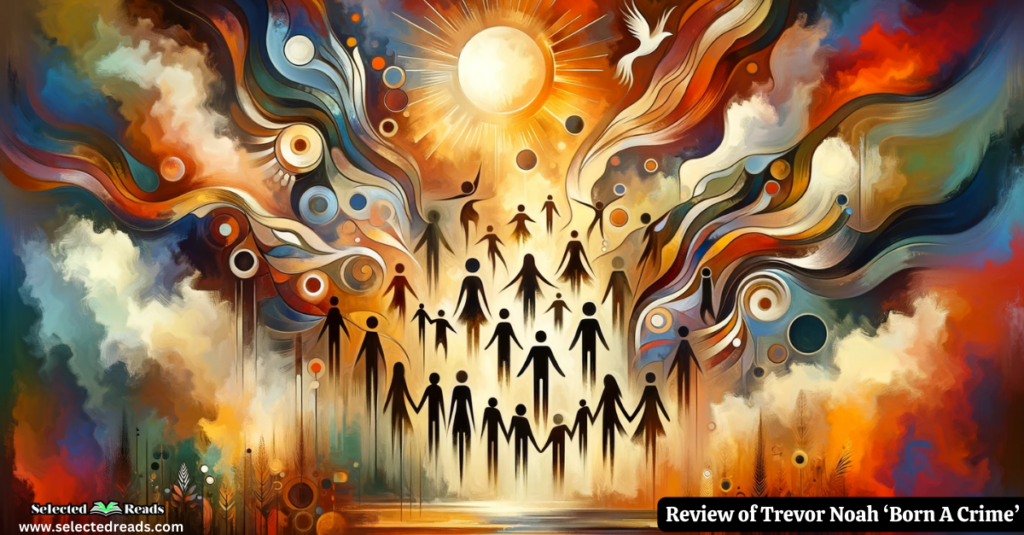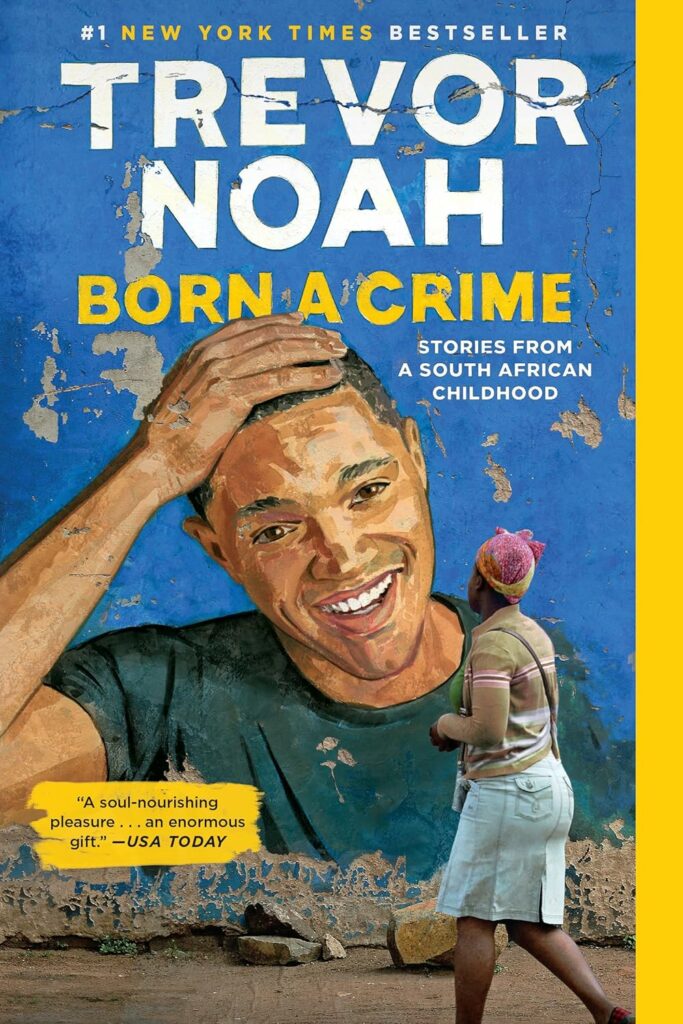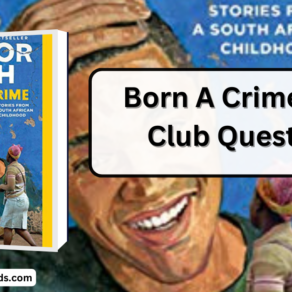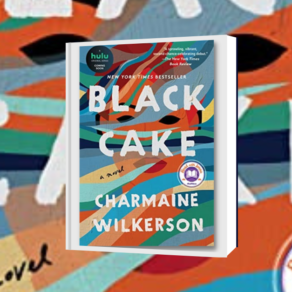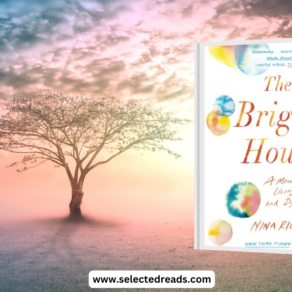“Born a Crime” is a memoir written by the comedian and host of The Daily Show, Trevor Noah. The memoir extends beyond mere autobiography, weaving a rich tapestry of humor, hardship, and humanity against the backdrop of apartheid South Africa. Noah’s life story serves as a poignant exploration of identity, resilience, and the transformative power of love between a mother and her son.
In this post, we will delve into an extended summary of “Born a Crime,” highlighting the main themes that Noah navigates through his narrative. These themes, ranging from the impact of apartheid on personal identity to the unyielding bond of family, provide a deeper understanding of the complexities and nuances of growing up in a world defined by racial divisions.
Moreover, for those who find themselves captivated by Noah’s eloquent storytelling and insightful reflections, I invite you to explore two additional posts: “Born a Crime Quotes” and “Born a Crime Book Club Questions.” In these pieces, we further unpack the wisdom and wit that Trevor Noah brings to the forefront, offering a collection of memorable quotes that resonate with readers and thought-provoking questions designed to enrich your book club discussions or personal contemplation.
Whether you’re a long-time admirer of Trevor Noah’s work or new to his literary journey, this series of posts aims to enhance your appreciation of “Born a Crime” and its significant contribution to conversations about race, culture, and the enduring human spirit.
Born a Crime Summary
In ‘Born a Crime: Stories from a South African Childhood‘, Trevor Noah recounts his personal journey from a childhood under apartheid South Africa to his eventual rise to fame as the host of The Daily Show.
This memoir is a compelling narrative that offers a multifaceted exploration of race, identity, and the complexities of growing up in a society divided by racial and cultural boundaries. At its core, the book is a testament to the resilience of the human spirit and the unbreakable bond between a mother and her son.
Trevor Noah was born to a white Swiss father and a black Xhosa mother at a time when such a union was not only frowned upon but punishable by five years in prison. As a mixed-race child, Trevor was considered an embodiment of his parents’ defiance and a symbol of their forbidden love.
Consequently, his early years were marked by secrecy, as his mother went to great lengths to protect him from the watchful eyes of the apartheid government. These formative years were characterized by Trevor’s confinement indoors, as well as a lack of identity in a society that strictly categorized individuals based on their race.
With the fall of apartheid and the ushering in of a new era of freedom, Trevor and his mother embarked on a journey of discovery and self-realization. Throughout the memoir, Noah describes their remarkable adventures and the myriad obstacles they faced, from economic hardship and subsisting on caterpillars to escaping an attempted kidnapping.
In the midst of these struggles, Trevor’s mother remained a staunch source of support, guiding her son with unwavering faith and a fierce determination to break the chains of poverty, violence, and abuse.
Photo: Amazon
Born a Crime provides a fascinating insight into the life of a young man grappling with the challenges of a fractured identity in a racially segregated society. The book is a brilliant blend of humor, drama, and poignant storytelling that delves into the intricacies of navigating adolescence in a turbulent time. Trevor’s witty and candid narration paints a vivid portrait of a world that is both heart-wrenching and inspiring.
Ultimately, the memoir is not only an account of Trevor Noah’s life but also a powerful ode to his mother, whose courage and indomitable spirit shaped the man he has become. The bond between mother and son forms the backbone of the narrative, highlighting the unwavering love that enabled them to survive and thrive against all odds.
Born a Crime Themes
In Born a Crime, Trevor Noah delves into several profound themes, drawing from Noah’s unique life experiences growing up in apartheid and post-apartheid South Africa. These themes are not only central to understanding his narrative but also offer broader insights into societal issues. Here’s a closer look at some of the main themes:
- Racial Identity and Apartheid: One of the most prominent themes in the book is the impact of apartheid on individuals’ lives. Noah’s mixed-race heritage places him in a complex position within South Africa’s rigid racial categories, providing a unique lens through which to explore the absurdities and cruelties of apartheid. His experiences highlight the challenges of navigating a society where racial identity dictates every aspect of life, from where you can live to who you can love.
- The Power of Language: Noah frequently discusses the importance of language in shaping identity, understanding, and power dynamics. He illustrates how language can both bridge gaps and reinforce divisions, emphasizing its role in his own ability to navigate different social groups. Noah’s mastery of multiple languages allowed him access to various communities, showcasing language as a tool for connection and survival.
- Family and Maternal Love: The relationship between Noah and his mother, Patricia Nombuyiselo Noah, is central to the narrative, underscoring the theme of unconditional love and sacrifice. His mother’s strength, wisdom, and unconventional approaches to parenting are highlighted as foundational to his character and success. This theme celebrates the resilience and determination of a single mother raising a child in a society hostile to their very existence.
- Resilience and Adaptability: Noah’s life story is a testament to resilience in the face of adversity. From navigating the complexities of his identity to overcoming poverty and violence, his ability to adapt and find humor in even the darkest situations is a recurring theme. This resilience, often inspired by his mother’s example, underscores the capacity to endure and thrive despite systemic obstacles.
- Humor as a Means of Survival and Resistance: Throughout the memoir, Noah uses humor to cope with and make sense of the harsh realities of his life. His ability to find comedy in tragedy not only serves as a personal coping mechanism but also as a form of critique and commentary on societal injustices. Humor becomes a powerful tool for resilience, connection, and understanding.
- The Impact of Colonialism and Historical Injustice: The legacy of colonialism and the enduring effects of apartheid-era policies on South Africa’s social fabric are underlying themes. Noah’s personal narrative offers insight into the broader historical and political contexts that shaped his life and the lives of millions of South Africans.
- The Search for Identity and Belonging: Noah’s struggle with identity and belonging, being a mixed-race child in a society that strictly enforces racial categories, highlights the complexities of finding one’s place in a world that often seeks to pigeonhole individuals. His journey reflects a broader exploration of how individuals navigate and reconcile multiple cultural heritages.
These themes contribute to the memoir’s richness, offering readers not just a glimpse into Trevor Noah’s life but also engaging with broader conversations about race, identity, love, and resilience.
Final thoughts
Trevor Noah’s “Born a Crime” stands as a powerful testament to the complexities of growing up under the shadow of apartheid, the resilience required to navigate such a landscape, and the profound influence of familial bonds, particularly the extraordinary relationship between Noah and his indomitable mother.
Noah’s narrative is a masterful blend of humor and gravity, offering insights into the absurdities of racial classification and the deep-seated divisions it creates. Through his personal journey, we’re invited to reflect on the broader implications of apartheid and its lingering effects on society. Yet, amidst these reflections, Noah’s story is ultimately one of hope, resilience, and the transformative power of love and humor in the face of adversity.



